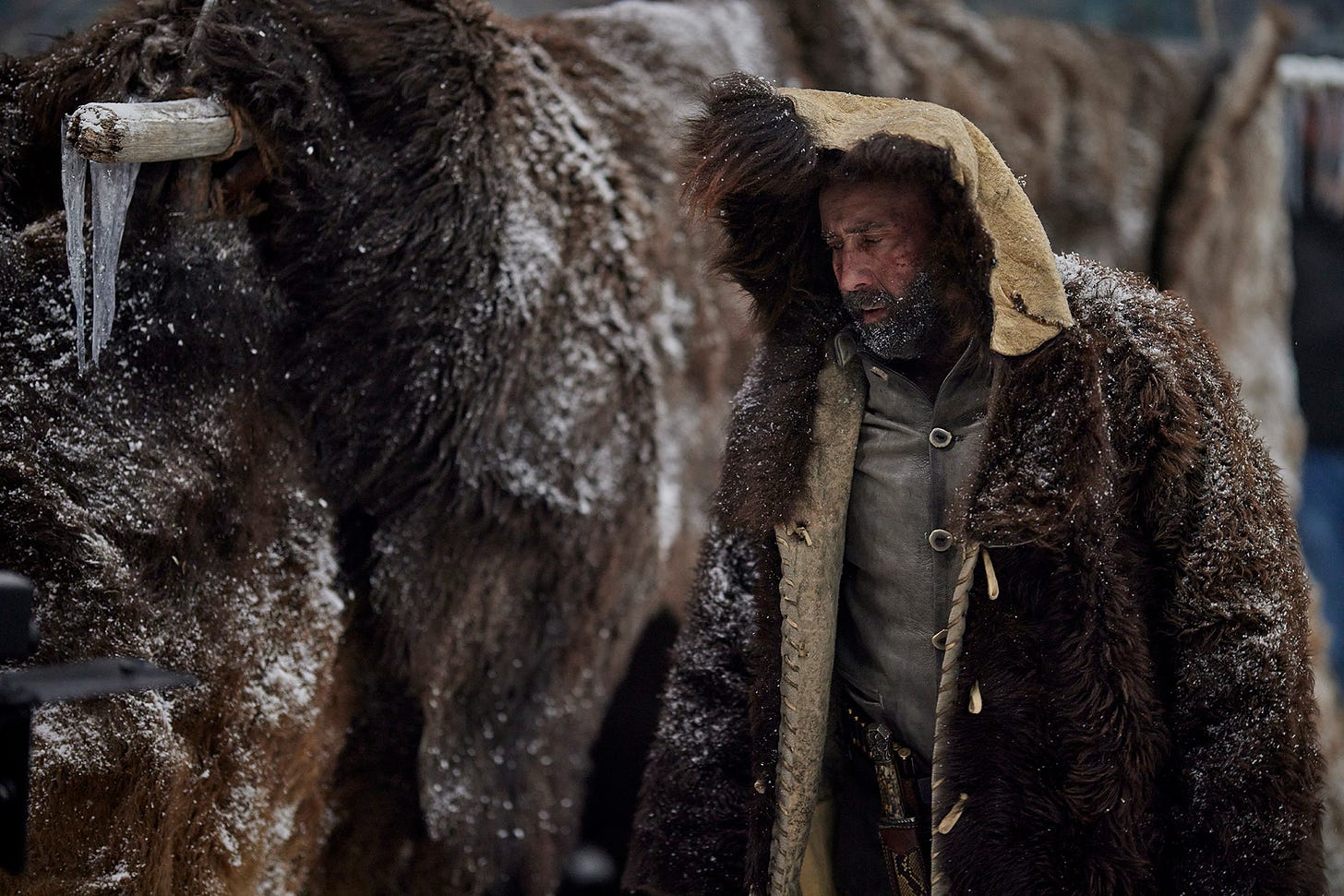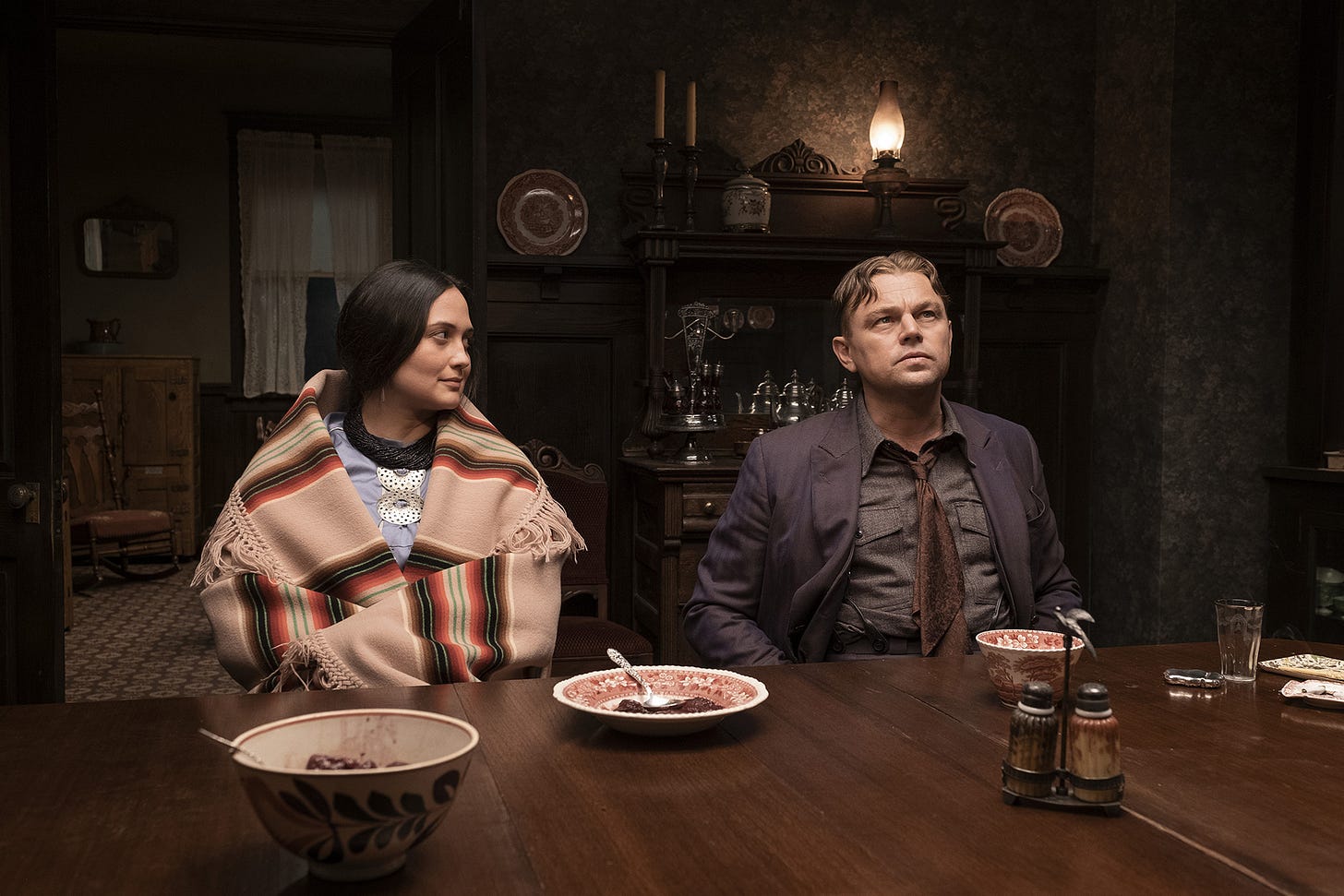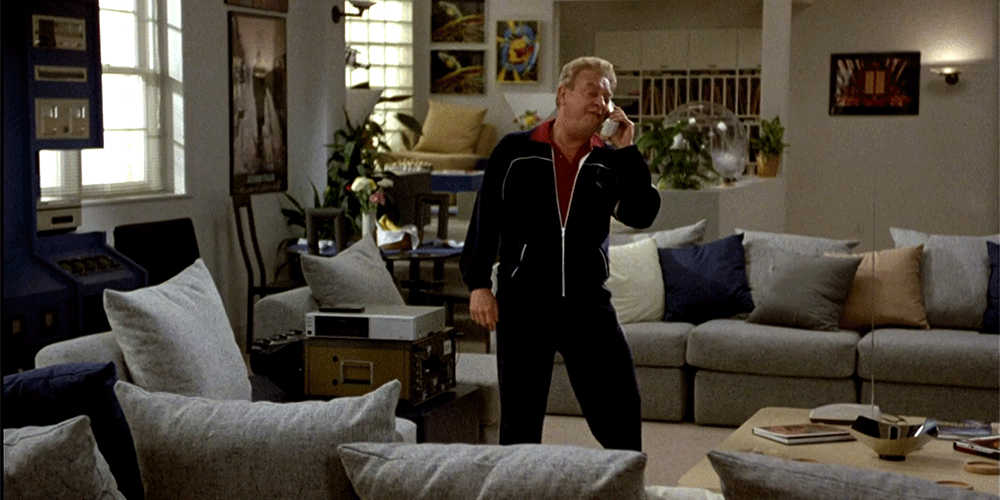From Netflix to Apple, Martin Scorsese is finding new homes to bring his passion projects and they are reaping the benefits with great reviews and Oscar nominations. Giving a film a wide release is not something Apple does, but that’s what’s happening with KILLERS OF THE FLOWER MOON this weekend. And not just “wide”. WIDE. This is a three-and-a-half-hour movie that’s opening EVERY theater in Buffalo. That’s insane.
And I don’t think you can blame the strikes for this decision. Some titles got pulled from the schedule, but not many. This is solely about word-of-mouth and a little bit of the shocking number OPPENHEIMER earned in a similar situation earlier this year. Will Marty pull that much? Doubtful. Taylor Swift’s concert parties aren’t BARBIE. There’s no friendly competition this time where fans are making a point of seeing both. I’d love to be proven wrong, though.
What I Watched:
BUTCHER’S CROSSING
(now in limited release)
Will Andrews (Fred Hechinger) leaves his Ivy League life in Boston to go west and find an old boarder who made a name for himself there. He doesn’t know what it is he needs to see, just that he won’t do so back home. The hope is that going on a buffalo hunt under Macdonald’s (Paul Raci) stewardship will get him closer to this amorphous epiphany, but the old man takes one look at the boy and laughs. The only person willing to show Will the brutality of nature is a hunter the rest have stopped trying to tame. For five hundred dollars, Miller (Nicolas Cage) will show the newcomer a sight most never thought could be seen again.
Based on John Williams novel of the same name, Gabe Polsky’s BUTCHER’S CROSSING is a familiarly harsh depiction of men going against nature with nothing but greed, vengeance, and hubris in their hearts. The script (adapted by the director and Liam Satre-Meloy) follows Miller’s hunting party moving through Native American territory north to Colorado where he once saw buffalo roaming in the hundreds—numbers Macdonald and the other locals haven’t seen in decades. With Will’s financial backing, he rounds up a trusted friend (Xander Berkeley’s Charlie) and a hired wildcard (Jeremy Bobb’s skinner Fred) to bring back the biggest bounty in history.
Along with the adventure aspects, gorgeous landscapes, and inevitable descent into madness once a month-long excursion turns sour as winter rolls in comes a welcome social commentary on the waste such capitalistic endeavors create in pursuit of fame. It’s surely the reason why the Blackfeet Nation assisted in the production both to supply the land and animals necessary to bring the narrative to life and the context with which to help illustrate the devastation wrought by this industry. Of all people to give it voice, you might be surprised the uncouth Fred is who ultimately laments the tragic cost of life left in their wake.
The film itself can grow a bit redundant as a result. Miller’s personal vendetta pushing him to kill every buffalo in this valley despite the others warning that they already have enough hides. Fred’s constant undermining and needling, taking his frustrations out on Charlie. And Will watching it all keenly—witnessing the truth that this mythic idea of what it means to be a “man” is a fantasy propped up by small, vindictive, and scared men using muscle and fear to compensate for their lack of humility and humanity. Miller never answers Will’s question about why he does this because it’s not necessary. We know he can’t do anything else.
Solid acting and impressive imagery more than make up for anything lacking as far as plot goes. BUTCHER’S CROSSING being a simple story is intentional and the novel presumably adds a lot more to it via the internal thoughts and motivations of the characters on the page. That’s not to say Polsky doesn’t do well to represent that psychological duress and learning of hard lessons on-screen. He does. It’s just that most of it is hard to miss and therefore present very early on without any real escalation in potency. Karma does eventually come to clean that disparity up, though. Because the land always finds a way to even the scales.
- 6/10
DEATH ATHLETIC
(hits VOD/DIGITAL HD on October 21)
Cody Wilson is sniffing his own farts from the start of Jessica Solce’s DEATH ATHLETIC. I honestly think his head is so far up there that he’d admit as much and find some SAT-level quote to smirk and explain how that fact actually makes him a hero and that it’s okay if you don’t agree. This is simply who Wilson is. Who people like Wilson are. Self-proclaimed disruptors who revel in the limelight of saying very little and living entirely on the success of discovering that they say it louder and more marketable than the next “smartest guy in the room”.
That’s what this documentary is: marketing. And a bit of self-canonization with parting remarks about how his “silence” or “defeat” won’t be willing. Is it a distraction from his conviction after having sex with a minor? Is it a curiosity and desire to be killed like he and many of his tribe believe their pseudonymized compatriot in DIY-arms was? Or is it simply ego? I don’t know. I also don’t really care. The fact that the film keeps going after Wilson’s arrest as if he was ever the most interesting part about it is wild to me. The final hour is a crawl as it twists itself into a pretzel to make him relevant to the message again.
Those first forty minutes, though? I’ll admit that they are intriguing. Do I agree with most of what Wilson says? No. Do I think being able to distribute files on how to make a firearm should be totally protected by the First Amendment? No. But there is a compelling argument to be made and the reality that his case to legally do exactly that has major ramifications on so many other things is important. I only wish Solce took us out of Wilson’s bubble to fully explain it. She sticks solely with him, his friends, and his lawyers as authorities on everything. If the topic is truly bigger than Wilson, why does he ensure he’s synonymous with it?
The whole becomes an echo chamber of false humility failing to mask an enormous superiority complex. It’s Wilson telling us why he’s correct and others who worship him confirming it without anyone really saying anything but buzzword rhetoric that reduces “free speech” to a catch-all phrase. If it were up to them, you should be able to scream “Fire!” in a crowd whenever you want because the act of saying the word doesn’t actually kill anyone. You aren’t forcing them to run and trample each other. That was their choice. Context is rendered inconsequential.
Sorry, but the utter lack of pushback or even an acknowledgement that pushback could exist by only platforming yourself with outlets that already share your affinity for “libertarian” ideals (Infowars and Oath Breakers both make an appearance) only exposes the piece as advertisement over information. Wilson says it himself when stating that Trump-era media culture is all “fake.” You either exploit that purpose or become exploited by it. There’s no better way to combat the latter than this.
- 4/10
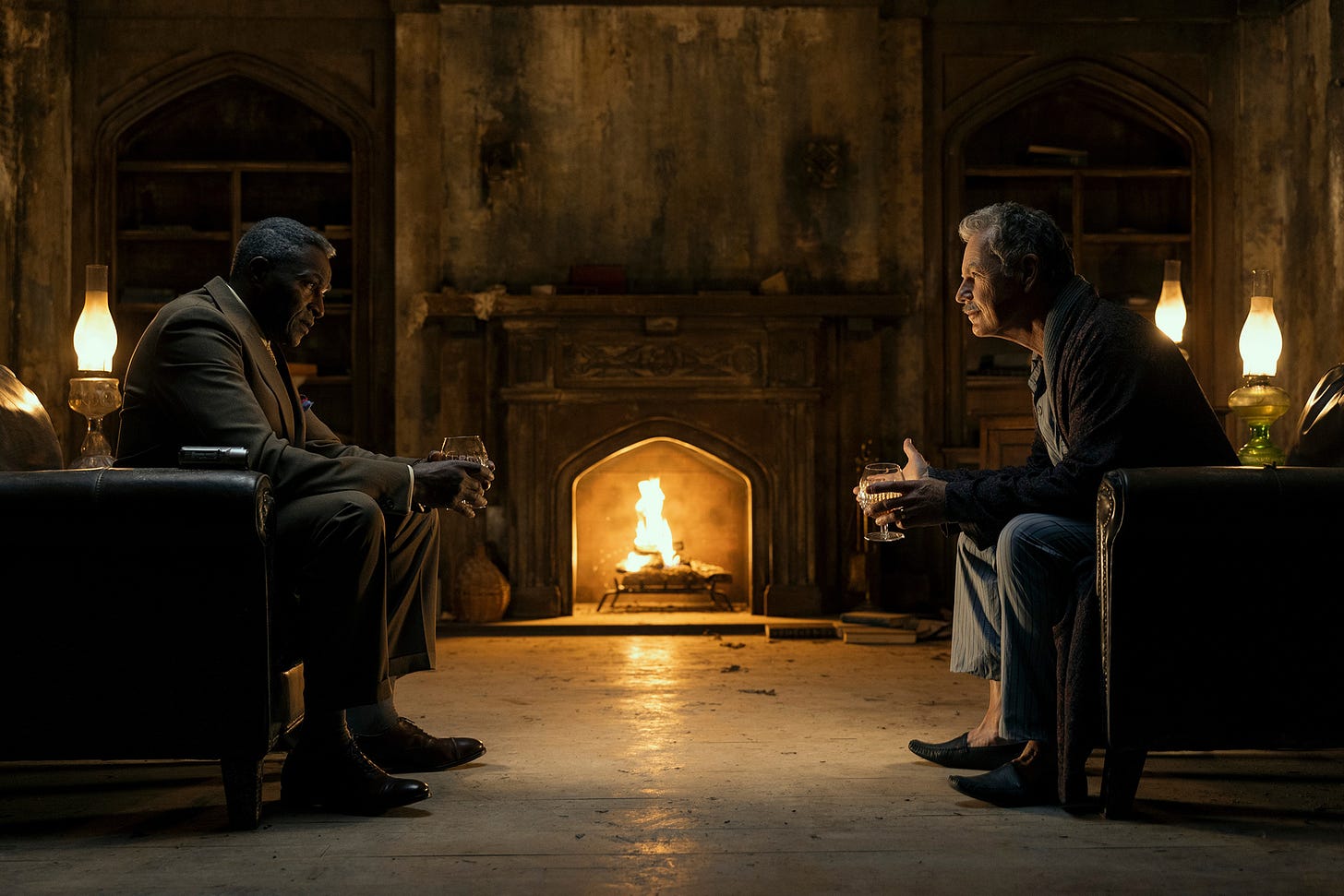
THE FALL OF THE HOUSE OF USHER
(streaming on Netflix)
I’m not that familiar with the works of Edgar Allen Poe. I’ve read some. Watched a movie or two. I even finished Kevin Bacon and James Purefoy’s THE FOLLOWING. So, I know the gist of the stories. I’m simply not some superfan with any thoughts on whether Mike Flanagan adapted the poet “correctly” via THE FALL OF THE HOUSE OF USHER. I’d guess the answer is “Yes, he did” considering I could see Poe’s plots, spirit, and themes shining through this Sackler family fanfiction amalgamation. But I’d also propose that it doesn’t matter. The only question should be whether it works on its own.
That’s the sign of a truly successful adaptation. Not whether it got every detail correct, but that it found a voice of its own from within the original’s inspiration. (I always use Ron Howard’s mediocre Dan Brown movies as an example of how filming the book is never the correct choice. You must turn the book into a movie and then film that.) I think this one works so well that it might be my second favorite of Flanagan’s Netflix miniseries projects behind THE HAUNTING OF HILL HOUSE. I liked BLY MANOR a lot, respect MIDNIGHT MASS despite it faltering somewhat, and have an affinity for THE MIDNIGHT CLUB due in large part to nostalgia, but USHER really puts everything together like that first foray.
Similar to how he handled Henry James’ and Christopher Pike’s work, Flanagan takes one Poe story as his scaffolding (USHER) and weaves the others into its tapestry to tell tales of each character’s inevitable demise. The title is thus about siblings Roderick (Bruce Greenwood, who took over the role from Frank Langella after he was fired for inappropriate behavior) and Madeline Usher (Mary McDonnell). They are the last surviving members of their bloodline and the end is nigh. He invites the short story’s “narrator” (Carl Lumbly’s C. Auguste Dupin) to see it, but also to explain what “really” happened to the others: six children given an episode each to fall themselves.
Episode One (MIDNIGHT DREARY) isn’t all exposition, however. It houses a murder too—the murder that starts everything that follows over half a century later. Then it’s debauchery in MASQUE OF THE RED DEATH. Carnage in RUE MORGUE. Insanity (BLACK CAT), guilt (TELL-TALE HEART), jealousy (GOLDBUG), and hubris (PIT AND THE PENDULUM) all en route to the finale’s returned focus onto Roderick himself (THE RAVEN). And while she takes many names and personas throughout the entire proceedings, it’s that last story where the name Verna (Carla Gugino) arrives. Not because anyone ever calls her by it, but because that name is an anagram of her Corvus form.
She’s as important to this tale as Roderick and both Gugino and Greenwood prove as much by giving everything they have to the roles. There’s an obvious severity to the overall macabre tone, but also a wealth of humor. These are two characters (matched by McDonnell’s Madeline) who know who they are and suffer zero fools as far as wasting time pretending anything different—that confidence inherently breeds comedy. This attitude is crucial too since everyone else does pretend in some respect. The children have been pitted against each other for so long that they all wear façades to survive their own insecurities, let alone the pressures of a very public existence to go along with any private ambitions they may still harbor.
Most of the kids are caricatures as result—funny in their own right too. Frederick (Henry Thomas), Tamerlane (Samantha Sloyan), and Camille (Kate Siegel) are the biggest with Leo (Rahul Kohli) and Perry (Sauriyan Sapkota) following closely behind. Victorine (T'Nia Miller) is the outlier. Her ambition is to do good in this world and she has a significant other (Paola Núñez) who’s kind-hearted and altruistic enough to almost keep the evil of the Usher name from corrupting her soul. As we know from the start, though, even Victorine must die. Almost isn’t quite enough. But it does provide a memorable parallel to Roderick’s own.
That “almost” isn’t his current wife Juno (Ruth Codd), but his first Annabel Lee (Katie Parker). Seen in flashbacks (with Zach Gilford, Willa Fitzgerald, and Malcolm Goodwin playing younger versions of Roderick, Madeline, and Auguste), we catch a glimpse of what this family might have been had money, pride, and revenge not taken hold. It’s the basis to one of the overall themes being the true definition of “rich” too. Is wealth an infinite bank account or a family who loves you? One of my favorite parts of the whole series is when the answer gets warped by Madeline when she wields the pain of its truth onto another so that she might escape the sting felt upon being its target first.
The production value is fantastic throughout—not an easy thing considering how much special effects work is needed to constantly haunt Roderick with the ghosts of those killed as a result of his actions. No matter how good the aesthetic or even the writing, though, the calling card of a Flanagan film/television series is the stellar work of his regular troupe of actors. The synergy and talent of this obviously close-knit group is so solid that it’s no surprise he punted Langella despite the numerous reshoots that would become necessary as a result. You cannot let an outsider—no matter how famous—taint the safe and collaborative space you’ve cultivated for over a decade.
That said, it’s great when outsiders do fit like a glove. McDonnell is great. So is Mark Hamill as the Ushers’ fixer/attorney (enough to earn another of my favorite scenes opposite Gugino in the finale). And you can’t diminish the role Lumbly plays as the straight man to this circus—our surrogate “non-believer” bearing witness to truths that cannot fully be explained by rare diseases or emotional trauma. As fantastic as Greenwood is delivering his “lemon” monologue, Lumbly’s reactions that both spark it and respond to it are equally necessary. GERALD’S GAME alums Greenwood and Gugino might steal the show, but it’s definitely not because the others can’t keep up.
- 8/10
FOUNDERS DAY
(screening at Toronto After Dark)
Mayor Blair Gladwell (Amy Hargreaves) is selling consistency with her re-election campaign. Her challenger, Harold Faulkner (Jayce Bartok), is promising change. Do either ever expand on what those buzz words mean? Do they need to when their small town knows them both by name? At a certain point all elections in this country have become popularity contests wherein policy and actual governing acumen are seen as liabilities instead of strengths. You can’t actually do anything anymore. Half the nation will turn on you if you do. So, all that’s left is screaming about what your opponent might do in your place.
This political masquerade sits at the back of director Erik Bloomquist and co-writer Carson Bloomquist’s latest collaboration FOUNDERS DAY. The titular festival is upon this sleepy neighborhood with the ballot boxes waiting their turn a couple days later. But it is just a backdrop. The brothers aren’t necessarily supplying us with a political horror thriller as much as dressing their comic slasher up in government clothes. Their murderer wears a powdered wig and wields a retractable ice pick gavel as though he’s doling out justice, but is he? Is killing kids truly justice? Or is it merely a distraction for petty jealousies?
Don’t think too hard about these questions while watching, though. Not because the Bloomquists don’t consider them, but because they do. What’s fun about the film is that it proves to be all those things at once. And rather than be a cop-out as a result (which, I’ll admit to believing once the climatic reveals arrive with what appears to be zero rhyme or reason), this reality enhances the whole. For one, it allows them to kill anyone and everyone on-screen. No one is off-limits—except maybe Allison Chambers (Naomi Grace) as our lead. But it also affords ample space for shifting motives to pivot between targets for additional exploitation.
There’s a reason for everything. It might not be the master plan you’re imagining in the moment, but it is purposeful if only to provide red herrings for the real plot to unfold. All the drama from teen romance—Naomi dating Melissa (Olivia Nikkanen) after Melissa broke up with Rob (Tyler James White) who’s now dating Lily (Emilia McCarthy) after Lily broke up with Adam (Devin Druid)—to a Montague/Capulet struggle set-up by Melissa and Adam being Faulkners and Lily being a Gladwell exists to make you prejudge the grudges and bloodlust. Just because those notions aren’t the end all justification, however, doesn’t mean they aren’t also true.
Add some laugh-out-loud moments (Kate Edmonds’ Britt screaming that she “learned her lesson” during detention only after watching someone get brutally murdered in front of her or anything the always great Catherine Curtin does as Police Commissioner Peterson) and it’s easy to get caught up in the goofiness as well as the mystery thanks to more level-headed characterizations via Grace and William Russ’ Mr. Jackson—a respected teacher who taught every single person in the movie at one point in his life. It never takes itself seriously and yet it has some serious moments to consider if not use beyond how it serves a punch line or death.
When it comes to the so-called “greater good,” the ends can justify the means … in theory. Any drop of blood split proves too much in the real world and Charles Manson-like puppet masters pulling strings are just as culpable as those holding the weapons, but wouldn’t it be nice to look the other way sometimes in fiction? If floods and locusts are acceptable means for God to earn a clean slate, why can’t a homicidal maniac “drain the swamp” so someone who actually cares about people’s lives can attempt to save democracy by stepping into the power void? At least until the job inevitably corrupts them too.
- 6/10
KILLERS OF THE FLOWER MOON
(now in theaters; streaming on AppleTV+ later in the year)
I read someone who said Martin Scorsese’s KILLERS OF THE FLOWER MOON felt like a five-hour movie cut down to its most potent three-and-a-half hours. They really hit the nail on the head. This account of the Osage tribe murders during the 1920s is riveting from start to finish without a single lull to even think to check your watch. I would even argue that it was rushed at times considering just how many bodies fall and how quickly the domino effect speeds up once the noose begins to tighten around the necks of those responsible (even if it could never be tight enough).
The non-fiction book by David Grann that Scorsese and Eric Roth adapted is nine-and-a-half hours long in audiobook format, so you can imagine the context and history that had to be left out to center everything on the actions of the naively simple yet voluntarily complicit man chosen as the film’s center: Ernest Burkhart (Leonardo DiCaprio). So, after a prologue showing the lamentation of Osage elders about the inevitable loss of their culture and decision to sell the oil under their land to the white man—resulting in the conditional wealth won by the next generation, the rest unfolds with a knowing air of betrayal.
Because the Osage are shown as loving King Bill Hale (Robert De Niro). He’s a friend they can trust. A man of means who didn’t try to take any of their lucrative land, but instead bought a cattle ranch nearby before using his clout to modernize the town. He spoke their language. Was an honored guest of their elders. And yet his scowl and judgmental eyes always calculating an angle or provoking a reaction tell a different story. All the silent, penetrating looks by white men on the periphery do too. And Scorsese makes sure to show them. Jovial smiles one second. Horror movie-esque stares the next. Everyone biding his time.
That isn’t Ernest, though. At least not on his own. Just returned from the war where he served as a cook, his decision to come to Osage stemmed from the larger-then-life persona his Uncle Bill possessed there. With his brother Byron (Scott Shepherd) already entrenched in the inner circle, Ernest saw an opportunity to get on his feet, make money, drink whiskey, and meet women. And Bill was only too accommodating knowing he could exploit that greed and those vices to his own benefit without fully giving up the game. He could use his nephew as another patsy in a malicious long con safely hidden from prying governmental eyes.
As such, despite the heartfelt love story that does commence between Ernest and his “full-blooded” bride Mollie (Lily Gladstone), its presence truly only renders the whole more tragic. Because Ernest does love his wife. More than anything. Even money—although he admits he almost loves it as much. It doesn’t stop him from listening to his uncle’s whispers or from absorbing them to the point of thinking they were his thoughts all along. I don’t say that to absolve him of his crimes, but to call attention to the complexity of his character and the mix of gullibility and shame that pushes him to do whatever is asked, regardless of the pain it will cause, to prove he belonged.
That aspect is why the film fits more in line with Scorsese’s gangster movies than his quieter dramas. Hale squeezes Ernest and Ernest squeezes Blackie Thompson (Tommy Schultz) and John Ramsey (Ty Mitchell) and Acie Kirby (Pete Yorn—yes, that Pete Yorn, joining a bunch of musicians from Jack White to Sturgill Simpson to Jason Isbell). And they’re all idiots doing the bidding of their leader in pursuit of money. Hale is the puppet master pulling everyone’s strings inside an elaborate plan with coordination from local lawmen, doctors, and the growing white population of men seeking Native brides. He plays matchmaker, pairing oil magnates with full-blooded families to steal it all.
And Scorsese doesn’t try to hide any of it. There’s no big reveal here. Just the sad truth of what happened and the sadder truth that the victims were helpless from fully recognizing its insidious strings. If there’s any surprise, it’s J. Edgar Hoover actually sending the Bureau to investigate (led by Jesse Plemons’ Tom White). Details like that are where you find yourself wanting to pick up Grann’s book to learn more about the politics and pressures resulting from a visit to DC by the Osage and the growing racial unrest sparked by the KKK. And yet it’s still a story too few know—much like the Tulsa Race Massacre, mentioned on-screen, which has also been brought to the forefronts of our consciousness by film/television.
I do hope Gladstone earns a nomination as the heart of the film. By marrying Ernest, her Mollie unwittingly puts herself into Hale’s crosshairs as family members die one by one around her. She provides the collective scream of an entire people more than once as tragedies continue to strike while their access to the fortunes that could do something about it weakens. And as every scene progresses, the curtain raises a little bit more to reveal the monsters lurking in plain sight. The actors don’t even have to change their deliveries or performances to sell it either. The script and editing shift the tone in such a way that Scorsese could have recycled footage and still sold the clarity of that thematic pivot.
That’s why this isn’t her film. Or even that of the Osage people regardless of whether that was Grann’s intent with his book. It can’t be. Scorsese understands he can’t hope to truly tell their story as a white man in a way that gives them the voice they deserve. So, he tells the tale of their oppressors instead. And he does so with zero sympathy for even their most sympathetic members. He adapts the source material in a way that depicts the nightmarish (and all too familiar) truth of white supremacy without leaving any room for “both sides” rhetoric. These are callous monsters doing anything and everything to maintain power by fostering genocide, sacrificing their own, and justifying it all in “God’s” name.
Mollie and the Osage are victims—souls left to die systematically and without remorse within a world that tricked them into thinking they were equals. The camera focuses on Ernest and Hale as those cheats, personifying their evil as a reminder of what was done and is still being done as laws are passed to sustain the erasure of this particular bit of American history from our curriculum. Whether malicious (De Niro may give us the year’s best villain thanks to that confident, duplicitous grin) or opportunistic (DiCaprio is very good as a conflicted man too shortsighted to see he’s conjuring his own demise), these are the faces of pure malevolence. Your neighbors. Your friends. Your so-called saviors. Smiling.
- 9/10
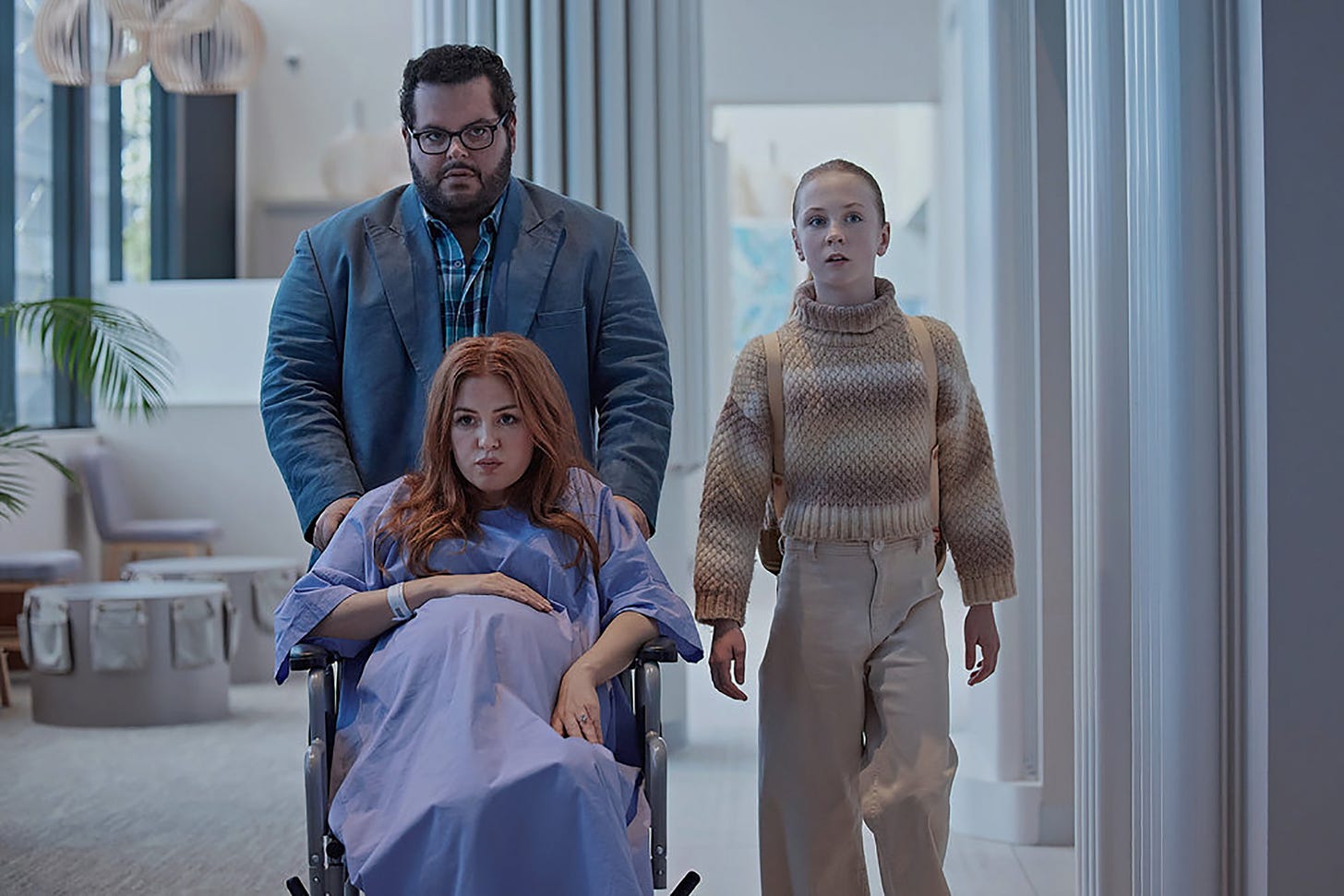
WOLF LIKE ME: Season 2
(now streaming on Peacock)
I appreciate a slow burn TV show—one that acknowledges the fact that it must advance the plot, but not at the sacrifice of the characters. Abe Forsythe understands this fact when it comes to WOLF LIKE ME. With just six episodes in Season One, he was able to introduce the flawed humanity of both Mary (Isla Fisher) and Gary (Josh Gad) en route to letting the pair wrap their heads around the fact that she’s a werewolf. It used fate and destiny to speed things along, focusing on the relationship (and its impact on Gary’s daughter Emma, played by Ariel Donoghue) rather than the consequences.
You would therefore assume those consequences would become the focal point of Season Two. But while they are to a certain point (Mary is pregnant and the question of whether the baby will also be a werewolf looms large), Forsythe continues to let them play out in the background. That’s no easy feat—especially when you also introduce a new conflict via Mary’s old professor (Edgar Ramírez’s Anton) showing up out of the blue. It seems on paper like a lot of stuff is happening (the inevitable birth, the mounting secrets, the fallout of the murders in the Season One finale), but it’s all secondary to the main thrust: Mary and Gary’s love.
Where the first season was about the two embracing fate in their hearts despite their minds screaming to run, these seven episodes present the characters an opportunity to reject destiny and live for themselves. What’s interesting, however, is that the choice isn’t a rejection of what was won. It’s a rejection of new coincidences that ask them to reverse course instead. Anton’s return. Gary meeting a potential love interest. The danger of their circumstances escalating to the point where staying together guarantees they’ll all get hurt. Do you let temptation force you onto an easier, but less fulfilling road? Or do you stay the course?
As such, the stakes can’t help but get raised too. Sarah (Emma Lung) and Ray (Anthony Taufa) can only watch Emma so many times on the full moon with so many different red flags before questioning if they need to intervene. The police are circling. Mary’s due date is right around a full moon. And technology proves to only be as good as the user when Gary tries to upgrade a system that Mary had already perfected. Despite the severity of their evolution as a “pack,” those stakes also lead to added comedy. And that’s where these new episodes shine.
Forsythe leans into the absurdity this season with dialogue treading in double meanings and impossible scenarios escalating from zero to sixty in an instant. (Why must the ultrasound tech quickly and silently leave the room? What did she see? Better chloroform her and run.) Some of the cliffhangers go for broke in this way too—forcing characters to see something that shocks them to their core enough to even make the audience gasp. Yet through it all, no matter the insanity, love still prevails. And both Gad and Fisher double-down performance-wise to prove it.
As the final shot of the season asks, though, can that love be enough?
- 7/10
Cinematic F-Bombs:
This week saw BACK TO SCHOOL (1986), NATIONAL SECURITY (2003), THE QUIET GIRL (2022), THE SEPTEMBER ISSUE (2009), and W. (2008) added to the archive. Rodney Dangerfield comes in as another early adopter of the PG-13 rating, getting himself a twofer in the process. cinematicfbombs.com
New Releases This Week:
(Review links where applicable)
Opening Buffalo-area theaters 10/20/23 -
BHAGAVANTH KESARI at Regal Elmwood
THE CANTERVILLE GHOST at Dipson Capitol; Regal Transit & Quaker
KILLERS OF THE FLOWER MOON at North Park Theatre; Dipson Amherst, McKinley, Flix & Capitol; AMC Maple Ridge & Market Arcade; Regal Elmwood, Transit, Galleria & Quaker
Thoughts are above.
LEO: BLOODY SWEET at Regal Elmwood, Transit & Galleria
THE NIGHTMARE BEFORE CHRISTMAS 30TH ANNIVERSARY at Dipson Flix & Capitol; AMC Market Arcade; Regal Elmwood, Transit, Galleria & Quaker
THE OTHER ZOEY at Regal Elmwood, Galleria & Quaker
TIGER NAGESWARA RAO ata Regal Elmwood & Galleria
Streaming from 10/20/23 -
DISCO INFERNO - Netflix on 10/20
FLASHBACK - Netflix on 10/20
KANDASAMYS: THE BABY - Netflix on 10/20
NIGHT OF THE HUNTED – Shudder on 10/20
OLD DADS - Netflix on 10/20
SAYEN: LA RUTA SECA - Prime on 10/20
SILVER DOLLAR ROAD - Prime on 10/20
THE PIGEON TUNNEL - AppleTV+ on 10/20
VJERAN TOMIC: THE SPIDER-MAN OF PARIS - Netflix on 10/20
AKA MR. CHOW - Max on 10/22
HOT POTATO: THE STORY OF THE WIGGLES - Prime on 10/24
MILLI VANILLI - Paramount+ on 10/24
BURNING BETRAYAL - Netflix on 10/25
LYNCH/OZ - Criterion Channel on 10/25
Now on VOD/Digital HD -
AFIRE (10/17)
“AFIRE is beautifully orchestrated with so many glimpses of joy and laughter from afar as Leon angrily watches, too embarrassed to ask to join and too prideful to admit the errors of his way.” – Full thoughts at HHYS.
ANONYMOUS SISTER (10/17)
BABY, DON’T CRY (10/17)
“It looks great and the acting is effective, but I couldn't stop feeling as though I was being held at arm's length from engaging with what I was seeing.” – Full thoughts at The Film Stage.
ELEVATOR GAME (10/17)
LYNCH/OZ (10/17)
THE MIRACLE CLUB (10/17)
PIAFFE (10/17)
“It can be very slow and is always weird in the absurdness of the sensorial fetishes that result, but you cannot deny its singular passion to provoke, arouse, and entertain.” – Full thoughts at HHYS.
THE RETIREMENT PLAN
SHAKY SHIVERS (10/17)
ANOTHER BODY (10/20)
KILLHER (10/20)
ROBERT IRWIN: A DESERT OF PURE FEELING (10/20)
SAW X (10/20)
SICK GIRL (10/20)





